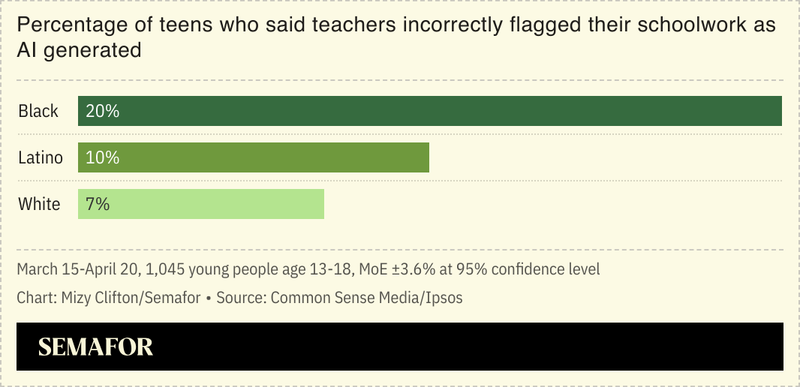The News
Racial biases have been known to creep into artificial intelligence algorithms. Now teachers are bringing it into the classroom as they police students’ use of generative AI tools like ChatGPT to complete homework, according to a new study by children’s safety nonprofit Common Sense Media.
The group found that Black teenagers in the US are about twice as likely as their white and Latino peers to have teachers incorrectly flag their schoolwork as AI-generated. Common Sense Media surveyed 1,045 13- to 18-year-olds and their parents from March 15 through April 20.
“This suggests that software to detect AI, as well as teachers’ use of it, may be exacerbating existing discipline disparities among historically marginalized groups,” said the report, which was released Wednesday. “In the United States, Black students face the highest rate of disciplinary measures in both public and private schools — despite being no more likely to misbehave — which contributes to negative impacts, such as lower academic performance.”

Know More
The findings aren’t surprising, Robert Topinka, a senior lecturer in media and cultural studies at Birkbeck, University of London told Semafor in an interview.
Part of the problem is that AI detection software is “wholly unreliable,” he said. It’s trained to flag generic and formulaic phrasing using pattern matching, but can’t distinguish between ChatGPT and spelling and grammar checkers like Grammarly, which means students risk being penalized even for using approved tools. And because learning disabilities like dyslexia are underdiagnosed in Black students, they are more likely to be falsely accused of cheating, he said.
Plus, white students are more likely to enjoy “tech privilege” in the form of access to AI technologies, as well as paraphrasing software that masks its use — which in turn “makes it easier [for them] to not get caught,” Topinka said.
“There’s also a dynamic of assuming that a white, middle-class person is able to produce the kind of language ChatGPT produces, whereas a Black, working class student isn’t given the benefit of the doubt that they could communicate in that way,” he added.

